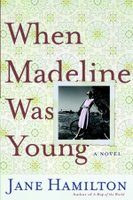
Just finished When Madeline Was Young by Jane Hamilton and I’m not 100% sure what I think of it. Still pondering as I write this. Perhaps that’s the sign of a good book? That it continues to engage you after you’ve read it? (If you’d like a plot summary, click on the link.)
The title of the book itself is intriguing. When Madeline Was Young. Was young? Madeline remains young throughout the story after suffering an accident which leaves her a perpetual six year old in terms of intellect and emotionally maturity. As the narrator of the story says, “…Madeline, the only one of us outside of time.”
This narrator is Mac. Watching this young boy grow up and become a husband and father, we learn about a special family, a family whose love and commitment make an unusual, unique situation acceptable — indeed, seem normal.
The story spans many years (the eras of the Viet Nam War, the Gulf War and the Iraq War) and deals with the familiar coming of age theme. (Except, of course, for Madeline whose “age” remains static.)
Through the lives and interaction of the many characters, the theme of opposites is revealed — the soldier vs. the conscientious observer, right wing vs. left wing politics, the doer vs. the thinker. Despite their differences, the characters demonstrate love and compassion for one another. They are family.
My reservations? I often found myself starting a new chapter (or even a new paragraph) wondering, “Where are we now?” This was undoubtedly due to the time span covered, the jumping back and forth between past and present and the numerous characters. (And my own inability to keep track of things?) I’m assuming this juxtaposition of past and present was deliberate. Our past creates our present. In fact, the present contains the past. (Am I going off on a esoteric tangent here?)
Every once in a while I found some of the sentence structure jarring. I know these particular sentences are grammatically correct but they seemed awkward. When a reader (or perhaps just this particular reader) must pause to re-read a sentence in order to make sense of it, that reader is taken out of the flow of the story.
Despite these (minor) criticisms, I do recommend this novel. I love Jane Hamilton’s other works — Disobedience, A Map of the World, The Book of Ruth. Perhaps I don’t love this one quite as much but it’s still up there in terms of quality literature and a moving story.
The title of the book itself is intriguing. When Madeline Was Young. Was young? Madeline remains young throughout the story after suffering an accident which leaves her a perpetual six year old in terms of intellect and emotionally maturity. As the narrator of the story says, “…Madeline, the only one of us outside of time.”
This narrator is Mac. Watching this young boy grow up and become a husband and father, we learn about a special family, a family whose love and commitment make an unusual, unique situation acceptable — indeed, seem normal.
The story spans many years (the eras of the Viet Nam War, the Gulf War and the Iraq War) and deals with the familiar coming of age theme. (Except, of course, for Madeline whose “age” remains static.)
Through the lives and interaction of the many characters, the theme of opposites is revealed — the soldier vs. the conscientious observer, right wing vs. left wing politics, the doer vs. the thinker. Despite their differences, the characters demonstrate love and compassion for one another. They are family.
My reservations? I often found myself starting a new chapter (or even a new paragraph) wondering, “Where are we now?” This was undoubtedly due to the time span covered, the jumping back and forth between past and present and the numerous characters. (And my own inability to keep track of things?) I’m assuming this juxtaposition of past and present was deliberate. Our past creates our present. In fact, the present contains the past. (Am I going off on a esoteric tangent here?)
Every once in a while I found some of the sentence structure jarring. I know these particular sentences are grammatically correct but they seemed awkward. When a reader (or perhaps just this particular reader) must pause to re-read a sentence in order to make sense of it, that reader is taken out of the flow of the story.
Despite these (minor) criticisms, I do recommend this novel. I love Jane Hamilton’s other works — Disobedience, A Map of the World, The Book of Ruth. Perhaps I don’t love this one quite as much but it’s still up there in terms of quality literature and a moving story.
No comments:
Post a Comment